|
|
|
Sort Order |
|
|
|
Items / Page
|
|
|
|
|
|
|
| Srl | Item |
| 1 |
ID:
076273
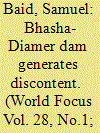

|
|
|
| 2 |
ID:
154028


|
|
|
|
|
| Summary/Abstract |
The British decision to quit India brought forth an essential question on the status of the princely states and their relationship with India and Pakistan. The British Cabinet Mission in 1946 however had declared that Britain’s paramountcy over the princely states would not be transferred to the successor government(s) but would simply lapse, meaning, rights that had been surrendered by Indian princes to the paramount power “will return to the states” ( Menon 1955:47).
|
|
|
|
|
|
|
|
|
|
|
|
|
|
|
|
| 3 |
ID:
081483
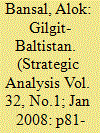

|
|
|
|
|
| Publication |
2008.
|
| Summary/Abstract |
Gilgit-Baltistan in Pakistan-Occupied Kashmir has witnessed a series of political disturbances and violence over the past years. Though many analysts have viewed the often-violent assertions by otherwise peaceful residents of this remote and mountainous region as occasional eruptions of the Shia-Sunni sectarian divide, a careful examination will indicate the deeper roots of alienation of the population in this long-neglected region. Almost total absence of democratic rights, lack of participation in the government and economic exploitation of the region coupled with ethnic, cultural and linguistic marginalisation appear to be the main factors that have led to this alienation.
|
|
|
|
|
|
|
|
|
|
|
|
|
|
|
|
| 4 |
ID:
073409


|
|
|
| 5 |
ID:
182144
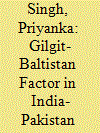

|
|
|
|
|
| Summary/Abstract |
Gilgit-Baltistan (GB), part of Pakistan occupied Kashmir, is swiftly ascending on the geopolitical horizon in the wake of coveted China
Pakistan Economic Corridor being built through it. Given India’s strident reservations on CPEC based on its extant claim on the region,
GB has gained considerable focus in the India-Pakistan equations as well. GB represents a stark reality that stares at India’s broader
quest against burgeoning Sino- Pakistan nexus on its periphery. The paper relooks at India-Pakistan dynamics-bilateral and geopolitical through the lens of GB while listing out India’s approach, position, and implications vis-à-vis GB.
|
|
|
|
|
|
|
|
|
|
|
|
|
|
|
|
| 6 |
ID:
190090
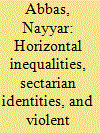

|
|
|
|
|
| Summary/Abstract |
Sectarian-based violent extremism has long been a security concern for the Government of Pakistan. Despite the perseverance of state authorities in countering violent extremism, a discourse centered on horizontal inequalities as the determinant of violent extremism and conflict remains lacking. This paper highlights the importance of an empirical study in understanding the nexus between horizontal inequalities and sectarian-based violent extremism in Gilgit-Baltistan (GB). By analyzing the responses from Shia and Sunni sectarian identities, the study contextualizes violent conflict and elucidates how horizontal inequalities intersect with sectarian identities in the capital city of GB. In doing so, socioeconomic and cultural inequalities have been evaluated. The study relies on a multistage random sample of 212 respondents through a structured questionnaire. The findings reflect significant socioeconomic inequalities between the sectarian identities and suggest a linear relationship in which horizontal inequalities generate identity-driven “us” vs “them.”
|
|
|
|
|
|
|
|
|
|
|
|
|
|
|
|
| 7 |
ID:
128501
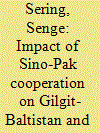

|
|
|
|
|
| Publication |
2013.
|
| Summary/Abstract |
The occupation of Gilgit-Baltistan by Pakistan and take-over of Xinjiang by China subsequently enabled both countries to build roads to consolidate their control over these regions. At the same time, opening of the Khunjerab Pass through the Karakoram Highway (KKH) allowed Pakistan and China to enhance commercial, military and political collaboration. However, the social, cultural and commercial interaction that today China and Pakistan has through the twin neighboring regions of Gilgit=Baltistan and Xinjiang
dates back several thousands of years. Since time immemorial, the mountain passes of the Karakoram Range facilitated traders and adventurers to travel through the valleys of Gilgit-Baltistan and Xinjiang and pursue their commercial and political interests in India, China and Central Asia. Then the shortest and safest among the passes, the Muztagh La, connected Braldo and Shaksgam valleys of Baltistan with important trading posts of Yarkand, Hotan, Kashgar, Badakhshan; admitting travel even farther north towards Beijing and Russia.' As part of the infamous Silk Route, Muztagh La pass facilitated "significant trade between Yarkand and the Braldo district of Baltistan"? At that time, Braldo was "central to the regional economy" and ranked high as the regional grain-basket? Many locals including those from the regional capital, Skardo, and the people of Hunza and N agar valleys made Braldo their home due to its strategic location on the famous trade artery. Social interaction enabled many Baltis to travel to Yarkand, Mazar and Khotan, and settle there.'
|
|
|
|
|
|
|
|
|
|
|
|
|
|
|
|
| 8 |
ID:
103024
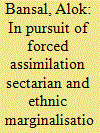

|
|
|
| 9 |
ID:
142470
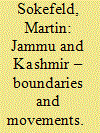

|
|
|
|
|
| Summary/Abstract |
Reacting very strongly to the statement of Pakistani prime minister, Yousuf Raza Gilani, in which he had said that Gilgit-Baltistan is part of Kashmir, the students of Gilgit-Baltistan staged a demonstration in front of National Press Club, Islamabad. They demanded apology from the prime minister for making ‘such baseless statements, contradicting his own past speeches and statements’. They also chanted slogans against the government for ‘playing with emotions of the people of Gilgit-Baltistan’. ( … ) The students said that people of GilgitBaltistan had fought a war of liberation and won it against a superior force of the Maharaja of Kashmir, also supported by Indian government. ‘The Kashmiris were invaders in our lands’, said a demonstrator. He further said, ‘we fought with them and made them flee the region but now the Pakistani political, civilian and military establishment is trying to murder our history of liberation.
|
|
|
|
|
|
|
|
|
|
|
|
|
|
|
|
| 10 |
ID:
132860
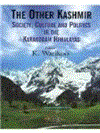

|
|
|
|
|
| Publication |
New Delhi, Pentagon Press, 2014.
|
| Description |
xiv, 341p.Hbk
|
| Contents |
In association with Institite for Defence Studies and Analyses (IDSA)
|
| Standard Number |
9788182747975
|
|
|
|
|
|
|
|
|
|
|
|
Copies: C:2/I:0,R:0,Q:0
Circulation
| Accession# | Call# | Current Location | Status | Policy | Location |
| 057856 | 320.09546/WAR 057856 | Main | On Shelf | General | |
| 057857 | 320.09546/WAR 057857 | Main | On Shelf | General | |
|
|
|
|
| 11 |
ID:
175890
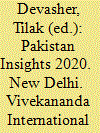

|
|
|
|
|
| Publication |
New Delhi, Vivekananda International Foundation, 2021.
|
| Description |
xxxviii, 282p.Hbk
|
| Standard Number |
9789390095186
|
|
|
|
|
|
|
|
|
|
|
|
Copies: C:1/I:0,R:0,Q:0
Circulation
| Accession# | Call# | Current Location | Status | Policy | Location |
| 059921 | 954.91/DEV 059921 | Main | On Shelf | General | |
|
|
|
|
| 12 |
ID:
104807
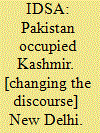

|
|
|
|
|
| Publication |
New Delhi, IDSA, 2011.
|
| Description |
52p.
|
| Series |
IDSA Pok project report May 2011
|
| Standard Number |
9788186019900
|
|
|
|
|
|
|
|
|
|
|
|
Copies: C:2/I:0,R:0,Q:0
Circulation
| Accession# | Call# | Current Location | Status | Policy | Location |
| 056064 | 320.9546/IDS 056064 | Main | On Shelf | General | |
| 056065 | 320.9546/IDS 056065 | Main | On Shelf | General | |
|
|
|
|
| 13 |
ID:
128516
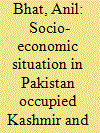

|
|
|
|
|
| Publication |
2013.
|
| Summary/Abstract |
in 1947 the combined population of Pak-occupied Kashmir (POK) and the 'Northern Areas" of Gilgit and Baltistan was 25 percent of the total population of ]&K State. Today this percentage has gone upto 33 percent of the total population of ]&K. The per decade growth rate of the population on both sides of the Line of Control (LoC) has remained the same. The steep rise in population in POK is because of the heavy in?ux of Punjabi Muslims from the plains. Today the Punjabi Muslims outnumber the Kashmiris in POK by a ratio of 5:1. Not only is 'Azad Kashmir' not Azad (free) - it hardly remains Kashmir except in name. Taking a cue from what the Chinese did in Tibet - the Pakistani Army has followed suit in POK - it has flooded the area with Punjabi Muslims to outnumber the Kashmiris in their own land. Most of the new Punjabi Muslim settlers were former soldiers of the Pakistani Army sent on a simple mission -
colonise Pakistan Occupied Kashmir, stamp out its Kashmiri identity all together, make it 'Pak' (which in Urdu means pure) by making it fully Punjabi. The grass always looks greener on the other side of the hill. It is a great tragedy that the strident propaganda of the jihadis has created a smoke screen that obfuscates the simple truth. Today we need to look across the LoC to see what is the reality. Not only is 'Azad Kashmir' no longer Kashmiri anymore in terms of demographic numbers, it never really was 'Azad' or free. In 1991, POK Prime Minister, Mumtaz Rathore was dismissed, arrested and flown by helicopter to a Pakistani prison.
|
|
|
|
|
|
|
|
|
|
|
|
|
|
|
|
| 14 |
ID:
149159
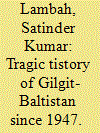

|
|
|
| 15 |
ID:
078994
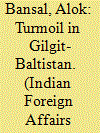

|
|
|
|
|
|
|
|